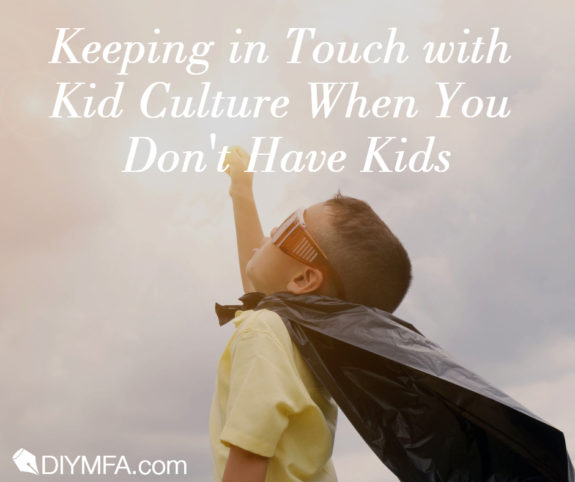You have an idea for a story and you’re pretty sure this is an idea that would appeal to kids, be they tots or teens. But you haven’t been a kid yourself in . . . well, a long time. And if you don’t have kids yourself, or your kids aren’t the same age as your intended readers, you may find yourself in a bit of a pickle.
Kids can always spot a phony, so authenticity is crucial. It’s important that your kid characters sound like real kids. And like kids of today, not kids when you were a kid.
What do kids these days like to read about? And how do you find out without being the creepy adult hanging around the playground?
Remember, all of this advice is provided in good faith. KEEP KIDS SAFE. It is your duty as someone who cares about what kids read to also prioritize their well-being. That means keeping an appropriate distance, keeping their parents in the loop, and never crossing the line into inappropriate behavior.
That said, if you want to write authentically you really do need to get to know some kids.
Cross the Great Kid-Adult Divide with these tips.
Meet the Parents
Parents are the gatekeepers of their kids’ safety and growth, and you should always defer to them. That said, parents can be a great resource for getting to know kids in general and their kids in particular. They won’t know the inner workings of a kids’ mind, but they can tell you more general stuff like their favorite games, or give you insight into how to talk to their kid about sensitive issues.
Start with Kids Who are Already in Your Life
Maybe you have siblings with kids, or a young cousin, or you have friends whose kids are the right age. You may not interact with these kids often, but if you explain to their parents that you’re writing and want to get to know your audience, chances are they will be happy to let you do so. They already know and trust you, so making a time for you to play or talk with the kids isn’t as big a deal as approaching strangers.
That said, they’re trusting you for a reason. Do your best to continue to earn that trust.
Talk to Actual Kids
Once you’ve secured permission to talk to a kid, be strategic about how you approach them. Depending on their age and what you’re trying to research, you may or may not want to be direct with the kids themselves. Very young children will want to play, while teenagers may be suspicious if you suddenly want to talk about their lives.
Talk with their parents ahead of time to get a feel for how open their kids are. The heavier your subject matter is, the more delicate you need to be in bringing it up. Make sure you get the parent’s go-ahead about any sensitive topics before you broach them with the kids.
Volunteer to Work with Kids
Look around your local community for opportunities to volunteer with kids, especially on an ongoing basis. Start with areas you’re already interested in, like literacy and libraries, then branch out to your non-writing hobbies.
You may find that helping with Saturday Story Hour or teaching kids to build bicycles will give you insight into how kids think. Over time you can get to know their mannerisms and speech patterns. This is also a great way to learn how kids interact in peer groups. And, you’ll be doing good work in your community. Everybody wins!
Observing kids is one thing. Having a purpose for being there, and for helping them, is another.
Over time, you can build relationships with kids and their parents, and eventually reach a point where you can be more direct about your writing and what you’re still researching.
Consume Their Media
It’s common advice for writers to read the kind of books they are writing, and kidlit is no exception. Read widely within your category and genre.
But don’t stop there. Watch their movies and TV shows and YouTube. Play their games, analog and digital. Listen to their music. Immerse yourself in the same media they do so you can understand why it appeals to them. How are they choosing to spend their time?
As the media landscape shifts, so does how kids experience media. Remember Saturday morning cartoons? Those are over, thanks to 24/7 options like Cartoon Network and Netflix. Kids today don’t remember a world before on-demand entertainment.
Most Importantly: Keep Kids Safe
This is a big deal, so I’m reiterating it. As someone with an interest in writing for kids, you have de facto signed on to care about the welfare of kids. If you can’t conduct yourself responsibly around kids now, how will you handle a book signing or a school visit? The adult lit community has already had to deal with allegations of authors trying to take advantage of fans, and the idea of such abuses extending into kidlit is horrifying. Don’t contribute to that.
Remember, you are a professional and an adult. Your young readers depend on you to act like it. They’re relying on you to put their needs and interests first. That means doing your research to better understand them and respecting their space. Readers will appreciate that you’ve put the work in.
 Bronwen Fleetwood writes fiction for young adults, and nonfiction for writers. Bronwen studied creative writing at Eugene Lang,The New School for Liberal Arts, has acted as leader of the Princeton Writing Group, and as a Municipal Liaison for National Novel Writing Month. Bronwen currently lives on the Whale Coast of South Africa, between the mountains, the sea, and a lake. You can connect with her at bronwenfleetwood.com.
Bronwen Fleetwood writes fiction for young adults, and nonfiction for writers. Bronwen studied creative writing at Eugene Lang,The New School for Liberal Arts, has acted as leader of the Princeton Writing Group, and as a Municipal Liaison for National Novel Writing Month. Bronwen currently lives on the Whale Coast of South Africa, between the mountains, the sea, and a lake. You can connect with her at bronwenfleetwood.com.







